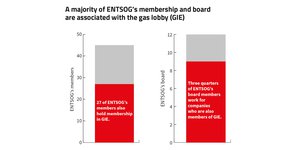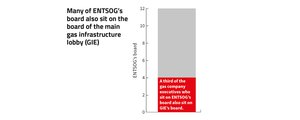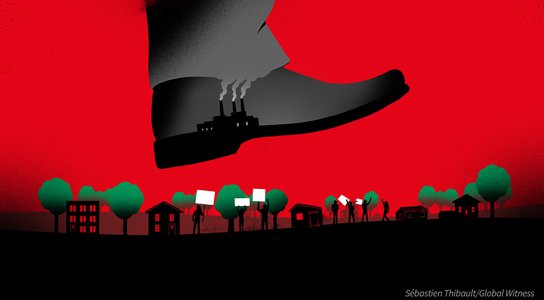The European Network of Transmission System Operators for Gas (ENTSOG), the gas industry body given significant power over EU energy policy, has refused to reveal meetings with its sister gas lobbying group Gas Infrastructure Europe (GIE) while also rejecting requests to disclose whether it has a conflict of interest policy.
ENTSOG was established by EU law in 2009 and has been given significant responsibilities – including a role in allocating billions of euros in EU funds to energy infrastructure projects – under the Trans-European Networks for Energy (TEN-E) regulation, which is currently being revised in a process that has reached final negotiations between the EU institutions.
Under the current TEN-E, every two years ENTSOG forecasts how much gas Europe will need in the following decade and produces a list of gas infrastructure projects that ENTSOG wants built according to that projected gas demand. The EU’s choice of what infrastructure projects it then supports is limited to those contained in that plan. This means that the European institutions rely on ENTSOG and its demand estimates in determining which projects can receive billions of euros in subsidies and other forms of profitable regulatory support.[1]
ENTSOG is not made up of independent experts though, instead it is run by the gas companies whose businesses rely on building and operating gas infrastructure. ENTSOG is governed by a membership of 45 gas companies, is overseen by a board solely made up of gas industry executives, and is managed by a gas company executive seconded to the group.
ENTSOG works on the same floor of the same office building in Brussels as its sister group, GIE. GIE is a gas industry lobby group also made up of European gas companies that operate pipelines, LNG import terminals and storage facilities.
The membership of the two groups overlaps significantly:
- More than half of ENTSOG’s members also hold membership in GIE.
- A third of the gas company executives who sit on ENTSOG’s board also sit on GIE’s board.
- Three quarters of ENTSOG’s board members work for companies who are also members of GIE.

GIE companies have benefited heavily from the EU funds made available by their friends at ENTSOG.
Gas infrastructure projects that involve GIE companies, backed by ENTSOG in their official role, have received €4.13bn in funding from the EU since 2013. Projects involving GIE members received over 80% of the EU’s gas infrastructure subsidies since 2013. Of that funding €440m has gone to projects that have failed or are viewed as likely to fail, according to Global Witness analysis, representing nearly ten percent of all EU gas infrastructure subsidies.
Given
this close relationship, there is the potential for a serious conflict of
interest between ENTSOG’s role under EU law and GIE’s role as a lobbyist for
the gas industry. Global Witness asked for ENTSOG’s records of its meetings
with GIE that might show any lobbying by its sister group. In response ENTSOG
did identify over a dozen different conferences and events that the two groups
coordinated around and participated in together since 2019, demonstrating their
frequent close collaboration, and confirmed that GIE participates in ENTSOG’s
consultations on gas demand planning.[2]
However, ENTSOG refused to reveal what other meetings or lobbying may have taken place saying “Like other organisations, it is not normal practice, nor practically possible, to share internal meeting records with any external third party.”[3]
ENTSOG is not like other organisations though – it functions as a regulatory body of the EU, with a crucial role in dispersing billions of euros in public funds and guiding EU energy policy. Most bodies involved with EU regulatory functions and policymaking are covered by transparency requirements which would require records to be publicly disclosed. This transparency is key to ensure “good governance and build trust in the policy-making process” while also an important tool for “preventing corruption and bad governance practices” as a European Parliamentary briefing put it. Despite its public function, ENTSOG is not subject to those EU transparency laws, allowing lobbying of ENTSOG to remain secret.[4]
Conflicts of interest
The crossover between GIE and ENTSOG continues in ENTSOG’s management. ENTSOG’s General Director Jan Ingwersen is seconded from Energinet, the Danish national transmission system operator for electricity and gas. GIE’s President, Torben Brabo is from the same company; he is currently CEO of Energinet’s gas business and represents the company on the ENTSOG board.[5]
Energinet is one of many gas companies that have done well out of EU subsidies, enabled by ENTSOG. The company is a part owner of the Baltic Pipe project, a gas pipeline from Norway to Denmark and Poland, which has received €266m in EU funding, nearly €52m of which came in funding which named Energinet as a beneficiary.[6]
ENTSOG’s role in the process for granting EU subsidies for gas projects that involve its members always represents a potential conflict of interest, but when a recipient gas company’s senior managers are so closely involved at ENTSOG a conflict of interest is clearly unavoidable.
Global Witness asked ENTSOG whether it had a conflict of interest policy. In response ENTSOG refused to confirm that it had a policy or share it with Global Witness saying “like other organisations and entities, it is, of course, not possible for ENTSOG to share such internal contractual documents with external third parties”.[7]
ENTSOG has also told Global Witness that the roles of regulators, the European Comission and others prevent any conflict of interest and it acts only as an expert in assessing all PCI applicants without discrimination while the Commission decides which gas projects to back.
Jan Ingwersen further told Global Witness that “I have not been involved in any part of the process of granting subsidies to Baltic Pipe or any other gas infrastructure project.” Ingwersen also said that “The PCI process is driven by the European Commission. The support for the projects is decided outside and independent from ENTSOG” and “final decisions on support is [sic] done by the European Parliament and the Council.”
Torben Brabo told Global Witness that “Energinet does not see any conflict of interest in this regard” and “I agree that it would be a problem if project promoters could decide on EU grants for projects”. However, he argued that ENTSOG does not grant EU subsidies but rather that decisions for funding are taken by the Parliament and Council.
For an organisation with such obvious potential conflicts of interest to refuse to even confirm or deny whether it has a policy to manage that risk is striking and shows that ENTSOG in its current form is not fit to advise on EU energy policy.
ENTSOG's lobbyists
ENTSOG told Global Witness that when it was created in 2009 the founding gas companies “decided to separate ENTSOG’s regulatory role from GIE’s role as the industry association.” They also claimed that “The distinct and transparent division of roles and agendas of two organisations, determined when ENTSOG was first established, ensure [sic] that regulatory and advocacy activities are managed separately by ENTSOG and GIE respectively.”[8]
However, ENTSOG appears to frequently cross the line between being an expert group advising EU institutions to taking lobbying positions alongside GIE and other industry groups it has links to.
In April 2020, ENTSOG joined GIE and other lobbying groups signing a letter that told the EU to use COVID-19 stimulus funds to pay for new “decarbonised” gas infrastructure. In June 2020, ENTSOG was among the signatories of a lobbying letter sent to EU officials calling for support for fossil fuel based hydrogen programmes. Other signatories of the letter included GIE, gas lobby groups Eurogas, GasNaturally and the International Gas Union and oil and gas companies including Exxon, Eni and Equinor. One of ENTSOG’s board members, an executive from Spanish company Enagas also sits on the Executive Committee of the International Gas Union and GasNaturally includes GIE and the International Gas Union in its membership.[9]
In September 2020, GIE and ENTSOG were among the signatories of a letter to EU officials on the regulation of greenhouse gas emissions, the letter opened with the line “We, the undersigned organisations representing the EU gas industry”.
With ENTSOG’s logo on these lobbying letters there is little pretence that ENTSOG is representing any interest other than the gas industry’s.
Regulators call for reforms
ENTSOG is subject to oversight by the European Union Agency for the Cooperation of Energy Regulators (ACER) and points to this in defending its role, however ACER has been extremely critical of the governance and work of ENTSOG.[10]
ACER has argued publicly that one of the “main problems” in assessing energy projects is the role of ENTSOG and its counterpart group that focuses on electricity, “being perceived as biased towards favouring more infrastructure, as this is in the interest of their business” and thus compromising the neutrality of the process.
ACER has been emphatic in its criticism of ENTSOG, announcing in May 2021 that it had identified “serious shortcomings in ENTSOG's gas network plans” such as the inclusion of “too many conventional gas projects” saying the nearly €75bn in gas projects put forward by ENTSOG was “clearly exceeding reasonable needs”. ACER slammed the role of gas companies in ENTSOG raising questions over the “credibility” of the group’s work and has called for reform through the TEN-E revision.
Gas funding must stop
The EU’s carbon emissions from gas now exceed those of coal. The European Commission’s own analysis shows that Europe will have to reduce its gas usage by up to 37% by 2030 compared to 2015 levels and almost entirely eliminate gas use by 2050 to meet its climate targets.
The European Commission is now consulting on which new fossil gas projects should get even more EU backing as part of the 5th Projects of Common Interest (PCI) list due to be finalised this year. The process for selecting projects, means that even if a gas project fails a sustainability test, it will not automatically be excluded from the list.[11]
Analysis by Global Witness has shown just how catastrophic funding the new listed gas projects would be for the planet; additional emissions from proposed gas projects would total at least 213 million tonnes of carbon dioxide every year - equivalent to the emissions of Germany’s fleet of coal plants in 2018.[12]
ENTSOG’s role in determining what projects receive subsidies and fast tracked approval from the EU represents an inherent conflict of interest and a danger to the climate. The close links between ENTSOG, the gas companies that govern it, and its refusal to disclose lobbying by its sister group GIE further shows that ENTSOG should not be trusted with the power it currently holds.
The TEN-E law that determines this process for allocating subsidies and support from the EU is currently being revised with final negotiations taking place this month.
The European Parliament’s position on the legislation does include increased oversight of ENTSOG’s role with greater powers for ACER to “enhance trust in the process” and a new role for an independent scientific body to input into the process to select projects for support.[13] This improvement in the governance of the process is vital and must be supported by the Council and Commission.
The amended TEN-E regulation should also be aligned with the EU Green Deal and the EU’s commitment to cut carbon emissions by at least 55% by 2030 and achieve carbon neutrality by 2050. This should include ensuring that all fossil fuel projects are excluded from future PCI lists, including those for fossil fuel derived fuels like hydrogen from fossil gas.
These projects should also be excluded from direct or indirect subsidies from the Connecting Europe Facility, European Regional Development Fund, and other EU funds that currently support PCI projects. Future infrastructure plans should instead prioritise renewable energy systems and building more energy efficient infrastructure.
Reforming gas rules
The reform of Europe’s gas market rules will also be proposed by the European Commission later this year, giving another legislative opportunity to reign in the influence of the fossil fuel industry and adapt our infrastructure to tackle the climate crisis.
The gas market reform must support a shift away from fossil gas towards efficiency, renewables and electrification, particularly in the heating sector. This means removing the subsidies, direct and indirect, handed out to gas companies, including to build new gas infrastructure. The costs of this transition should be fairly shared so that they do not fall on lower income consumers but instead are in line with the polluter pays principle.
To deliver this transformation, the package should establish a new governance system, removing the role of ENTSOG in planning our energy system and handing its tasks over to a genuinely independent expert body. The role of gas companies that operate national level distribution grids should also be limited and their planning processes subject to much greater oversight and alignment with climate targets.
Ultimately to secure action on the climate we need fossil free politics. Rather than gas companies being given privileged access to policy making a firewall needs to be built between public officials and fossil fuel companies. In the same way the tobacco industry was barred from lobbying on health policy we must cut the pipeline between polluters and politicians if we want to tackle the threat of climate change.
- Download PDF version : The Gas Subsidy Pipeline (1.9 MB), pdf
[1] European Union, Regulation (EC) No 715/2009, 13 July 2009, art. 6, 8; European Union, Regulation No. 347/2013, 17/4/2013, Preamble sec. 21.
[2] ENTSOG email to Global Witness, 7/6/2021.
[3] ENTSOG email to Global Witness, 7/6/2021.
[4] ENTSOG email to Global Witness, 28/5/2021.
[5] Gas Infrastructure Europe, “GIE Board, https://www.gie.eu/dna/gie-board/ ; LinkedIn, “Torben Brabo”, https://www.linkedin.com/in/torben-brabo-965b554/?originalSubdomain=dk; ENTSOG, “Structure”, https://www.entsog.eu/structure;
[6] Baltic Pipe, “Partners”, https://www.baltic-pipe.eu/about/partners/ Gaz-System, “Baltic Pipe”, https://en.gaz-system.pl/our-investments/integration-with-european-gas-tramsmission-system/baltic-pipe/#:~:text=The%20Baltic%20Pipe%20is%20a,to%20customers%20in%20neighbouring%20countries ; Energinet, “Baltic Pipe”, https://en.energinet.dk/Infrastructure-Projects/Projektliste/BalticPipe ; CEF Energy, grants 8.3-0019-DKPL-S-M-15 - €387,374, 8.3-0025-PLDK-S-M-17 - €33,149,601, 8.3.1-0009-PLDK-S-M-18 - €18,300,000 and 8.3.1-0035-PLDK-W-M-18 - €214,920,000
[7] ENTSOG email to Global Witness, 7/6/2021.
[8] ENTSOG email to Global Witness, 28/5/2021.
[9] Francisco Pablo de la Flor García, https://www.entsog.eu/structure; https://gasnaturally.eu/about-gasnaturally/our-members/
[10] ENTSOG email to Global Witness, 7/6/2021.
[11] European Commission, 14/1/2021, “Consultation on the list of candidate projects of common interest in electricity and gas”, https://ec.europa.eu/info/news/consultation-list-candidate-projects-common-interest-electricity-and-gas-2021-jan-14_en; Food and Water Action Europe, Friends of the Earth Europe and Global Witness, 23/7/2021, “Complaint regarding the sustainability assessment criteria in the fifth Projects of Common Interest (PCI) list”, https://friendsoftheearth.eu/wp-content/uploads/2021/07/FWAE_FOEE_GW_Fifth-PCI-List-Complaint_22072021.pdf ; European Commission, 15/6/2021, “Methodology for assessing the gas candidate PCI Projects PCI 2020-2021 exercise”, https://circabc.europa.eu/ui/group/3ba59f7e-2e01-46d0-9683-a72b39b6decf/library/8248eebd-2590-44b1-b1c8-01bcb01ea7af?p=1&n=10&sort=modified_DESC
[12] Global Witness, 26/7/2021, “European Commission ignored climate impacts of favoured gas projects”, https://www.globalwitness.org/en/press-releases/european-commission-ignored-climate-impacts-favoured-gas-projects-ngos-refer-case-ombudsman/ ; For all calculations, citations, and methodologies used to determine carbon emissions, see Global Witness, EU Proposed 5th PCI List - Possible CO2 Emissions, 25 June 2021, available at https://gwitness.org/5th_PCIList_Carbon_Emissions.
[13] Proposal for a Regulation of the European Parliament and of the Council on guidelines for trans-European energy infrastructure and repealing Regulation (EU) No 347/2013, EP PLENARY TEXT (doc. A9-0269/2021), AM21


